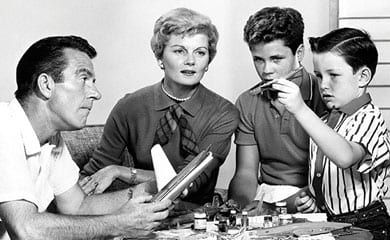
The ABC is required to present a range of views and opinions, as a regular listener to ABC radio, I understand this means I will spend some portion of my listening time yelling things at the radio. I’m ok with that, it’s a necessary part of the aging process.
But, as the relatively new saying goes, you can have your own opinion, but you can’t have your own facts. Which is why the Radio National Counterpoint segment entitled “Domestic violence: hijacked by feminists?” wasn’t just irritating, it was ill-informed and irresponsible.
If you can’t (or just don’t want to) listen to the whole thing, you can get the general gist from the storify of @SwearyAnthony live tweeting his apoplexy as he listened to it (be warned, @SwearyAnthony has that handle for a reason).
Counterpoint is supposed to present controversial views and question the prevailing wisdom. This can be an incredibly valuable part of informing public debate when it’s done well. It’s just difficult to understand how they achieved that by presenting rambling and incoherent misinformation from a self declared “not an expert in this”, who didn’t have an argument so such as she had a series of complaints about how we should all live in nice white suburbs of the 1950s, where nothing bad ever happened to anyone.
Violence is not an invention of the modern age. Violence within families, and sexual violence against women and children are not new, not more prevalent now and not caused by the disappearance of a mythical world in which everyone lived in a Leave it to Beaver set.
For 40 years we’ve been telling girls they can do whatever they like, I have to be frank, a lot of women then get themselves into situations
There’s not a lot of point debating ill-informed ideologues, the straw man arguments and passionate attachment to nostalgia for a time that never existed isn’t something you can address with logic and facts. But perpetuating myths about violence, which we know affects somewhere between 30 and 50 per cent of the population, is dangerous. Those myths, if they are not debunked, get in the way of our ability to discuss the causes and effects of violence, and the actions government and communities can take to address them.
When you get statistics from organisations like the ANROWS then I think that’s part of the real problem, this is a feminist organization which wants to push a certain line obviously.
The data she is talking about is in the Horizons report recently released by ANROWS. The report was produced by Dr Peta Cox, from the data supplied by the Australian Bureau of Statistics, which is hardly a “feminist organisation”.
The entire interview seemed to be based on one premise:
I think the real problem with domestic violence is the breakdown of the protective nuclear family which, in itself is a protection against domestic violence.
It’s a bizarre statement. By its very definition, domestic violence is something that occurs within a family, a marriage license is certainly no protection and we know that violence occurs in nuclear families, wealthy families, white families and that it always has. The only real difference in recent times is that it is now a matter for public discussion, not a secret shame to be hidden from view. It is also something that we now understand as a gendered issue that needs a public response. Wilfully denying it as such, simply because it’s an uncomfortable truth is not going to make it go away.
There are legitimate questions to ask about the way we talk about domestic violence. It is true that we concentrate far too much on intimate partner violence, rather than the full picture of family violence, which involves all members of the immediate family and accounts for as many, if not more, incidents of family violence than just partners.
It is also true that talking about male victims of domestic violence gets complicated in the public debate by the constant derailment of discussion about female victims. As anyone who has ever attempted to have a conversation online about male violence against women will know, the “but what about the men” hand grenade is frustratingly inevitable. We should be talking about male victims; but we also need to talk about the fact that they are most like to suffer at the hands of other men – again family violence is much bigger than just intimate partner violence.
But we don’t have to talk about male victims at the expense of talking about female victims. It’s not a competition of trauma, it’s a recognition that men and women experience violence differently, and so we need to talk about different effects and solution for both.
The interrelating and complicating factors of alcohol, substance abuse, mental health issues, intergenerational damage and poverty are also issues that must be a part of the discussion about cause and effect. This disproportionate representation of Aboriginal women in domestic violence victims is tragically true and should absolutely be at the forefront of the solutions we talk about. But only where the complexities of those factors, and how they relate to cause and effect, are an integral part of that discussion. Violence within families is complex, it doesn’t have one simple expression or one simple cause. Suggesting that all forms of family violence can be attributed to a single source is dangerously ignorant.
As is ignoring the gendered nature of violence, both in victims and perpetrators.
The ABC has produced some outstanding content on family violence, for which they were rightly applauded. Taking an alternative view on the mainstream discussion is possible, even required, but they can and should do better than this.


